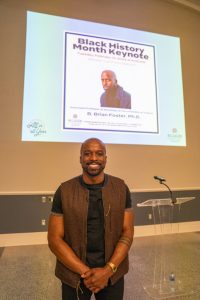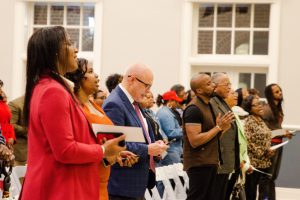
The University of Mississippi Center for Inclusion and Cross Cultural Engagement welcomed keynote speaker B. Brian Foster on Tuesday, Feb. 13 in honor of Black History Month.
A former UM professor, Foster is now an associate professor of sociology at the University of Virginia. He is also an ethnographer, multimedia storyteller and author. Foster delivered the keynote address on his new book, “Ghosts of Segregation: American Racism, Hidden in Plain Sight.”
“If we imagine the land as an archive, it places a little bit of responsibility on us to imagine ourselves as archivists who are curious about our history and are willing to do the work to preserve and try to interpret our history,” Foster said. “What happens when the histories that the land is keeping tell us things about ourselves that maybe don’t put us in the best light?”
Published on Feb. 6, the book is a collaborative project between Foster and award-winning photojournalist Richard “Rich” Frishman. Through a collection of photo essays, they showcase the landscapes and memories that speak to America’s history of racial oppression.
His history with UM is not the reason Foster agreed to deliver the address. To Foster, the opportunity brought the chance to reconnect with Mississippi as a whole.
“I do care about (the keynote address) being in my home state of Mississippi. It means a lot for me to be able to have these conversations with people who are from where I’m from,” Foster said. “I’m a Black boy from Northeast Mississippi, so I said yes because I wanted to be able to come to Mississippi and talk to Mississippi people.”
Surrounded by memories of family, Foster began to conceptualize the interconnectedness of his familial history and that of the Black community.

“I was at a point at the end of 2020, coming into 2021, where I was thinking a lot about family and my own personal biography,” Foster said. “I was thinking of the connecting points between my family’s history and the history of Black people in the country, my own history and the experiences of Black people in the country.”
Foster emphasized that the main focus of the book project was Black American history.
“In particular, it’s important to say that this is a project about American racism. So it’s not just, you know, a cute little history of who we are,” Foster said. “It’s a specific history about hundreds and hundreds and hundreds of years of oppression and violence in segregation and displacement and dispossession.”
In order to demonstrate this history, Foster looked toward the world around him. The roads he walked on and the buildings he entered became archival pieces that told the story of America’s past and possible future.
Junior multidisciplinary studies major Janelle Minor attended the keynote address and said she liked the perspective of talking about family and viewing her environment as history.
“I really enjoy thinking about the way that (how) someone is raised can impact the work that they do and the way that they interact with the history that may not even be their family’s history,” Minor said. “I really took away just being more observant of my surroundings because I think Oxford itself has a lot of history and just keeping my eyes open for subtle cues of history that might still be here.”
Daneel Konnar, a senior public policy leadership major, agreed that stories are important to our understanding of the people and the world around us.
“The event was truly eye-opening, allowing me a unique opportunity to gain a new perspective of the importance of storytelling and how it plays a pivotal role during Black History Month,” Konnar said. “I wanted to gain a new perspective and understanding of what shapes the world we live in. Foster’s work is the epitome of this, and I knew I could gain this by attending the event.”
Although his book and the philosophy behind it were the driving points of the keynote, Foster ultimately wants to call people to action.
“I’m asking more than to just think about our history and our land around us,” Foster said. “Seek out the truth, be willing to tell that truth and be willing to be uncomfortable in the telling.”



























